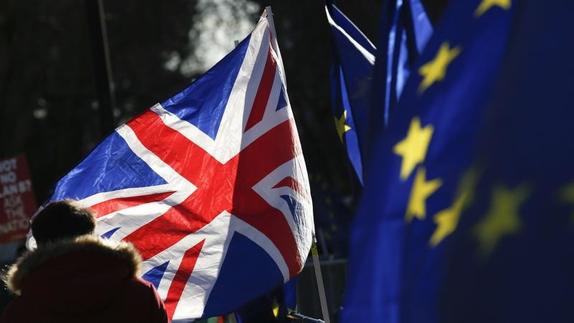 In this Jan 22, 2019 photo, the British flag, also known as a Union Jack, flies beside European Union (EU) flags during pro and anti Brexit protests outside the Houses of Parliament in London, UK. (LUKE MACGREGOR / BLOOMBERG)
In this Jan 22, 2019 photo, the British flag, also known as a Union Jack, flies beside European Union (EU) flags during pro and anti Brexit protests outside the Houses of Parliament in London, UK. (LUKE MACGREGOR / BLOOMBERG)
LONDON/BRUSSELS - Britain and the European Union cautioned each other on Monday that time was running out to reach a Brexit trade deal, with negotiators still seeking agreement on state aid, enforcement and fishing to avoid a turbulent exit in a month.
The United Kingdom leaves the EU’s orbit on Dec 31, when a transition period of informal membership ends following its formal departure last January, and the sides are trying to secure a deal to govern nearly US$1 trillion in annual trade.
The United Kingdom leaves the EU’s orbit on Dec 31, when a transition period of informal membership ends following its formal departure last January, and the sides are trying to secure a deal to govern nearly US$1 trillion in annual trade
Prime Minister Boris Johnson, who is also tackling Europe’s worst official death toll from COVID-19, says a deal would be preferable but that Britain, which joined the EU in 1973, would flourish without one.
ALSO READ: UK rejects latest EU fisheries offer with talks set to resume
“We really are now running out of time. This is the crucial week -- we need to get a breakthrough,” British Environment Secretary George Eustice told Sky, adding that if good progress was made this week then negotiations could be extended.
The EU delivered a similar message.
“We are running out of time here,” said Irish Foreign Minister Simon Coveney, whose country is in the EU. “The truth of Brexit is now being exposed in terms of the challenges of it.”
After breaking multiple deadlines, the negotiators are stuck mainly on fishing, state aid and how to resolve any future disputes.
ALSO READ: Brexit: Barnier heads to London for talks, warns of divergences
A trade deal would not only safeguard trade but also buttress peace in British-ruled Northern Ireland, though some disruption is almost certain at the busiest EU-UK border points.
Failure to secure a deal would snarl borders, spook financial markets and disrupt delicate supply chains that stretch across Europe and beyond -- just as the world grapples with the vast economic cost of the COVID-19 outbreak.
Fish
British Foreign Secretary Dominic Raab said it was a significant week for Brexit. Talks between EU chief negotiator Michel Barnier and British chief negotiator David Frost continued on Monday.
Asked whether there was reason for optimism, Barnier told reporters: “There are reasons for determination.”
Ireland’s Coveney said a deal could be done if there was give and take on both sides but told Ireland’s Newstalk Radio that a failure to agree on fishing rights could wreck a deal.
“If there isn’t an agreement on this, the whole thing could fall on the back of it and that’s the worry,” he said.
READ MORE: EU's Barnier says 'very serious' gaps still in Brexit trade talks
Fishing alone contributed just 0.03 percent of British economic output in 2019, but it is an emotive subject as many Brexit supporters see it as a symbol of the regained sovereignty they hope leaving the EU will bring. Combined with fish and shellfish processing, the sector makes up 0.1 percent of UK GDP.
Britain wants “zonal attachment” to agree a total allowable catch for the United Kingdom’s waters - a step that would give it a much larger quota share than if the fish maths were worked out on the EU’s proposals.


